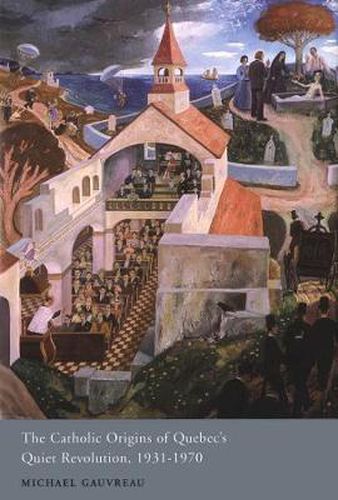Readings Newsletter
Become a Readings Member to make your shopping experience even easier.
Sign in or sign up for free!
You’re not far away from qualifying for FREE standard shipping within Australia
You’ve qualified for FREE standard shipping within Australia
The cart is loading…






The Catholic Origins of Quebec’s Quiet Revolution challenges a version of history central to modern Quebec’s understanding of itself: that the Quiet Revolution began in the 1960s as a secular vision of state and society which rapidly displaced an obsolete, clericalized Catholicism. Michael Gauvreau argues that organizations such as Catholic youth movements played a central role in formulating the Catholic ideology underlying the Quiet Revolution and shows that ordinary Quebecers experienced the Quiet Revolution primarily through a series of transformations in the expression of their Catholic identity. Providing a new understanding of Catholicism’s place in twentieth-century Quebec, Gauvreau reveals that Catholicism was not only increasingly dominated by the priorities of laypeople but was also the central force in Quebec’s cultural transformation. He makes it clear that from the 1930s to the 1960s the Church espoused a particularly radical understanding of modernity, especially in the areas of youth, gender identities, marriage, and family.
$9.00 standard shipping within Australia
FREE standard shipping within Australia for orders over $100.00
Express & International shipping calculated at checkout
The Catholic Origins of Quebec’s Quiet Revolution challenges a version of history central to modern Quebec’s understanding of itself: that the Quiet Revolution began in the 1960s as a secular vision of state and society which rapidly displaced an obsolete, clericalized Catholicism. Michael Gauvreau argues that organizations such as Catholic youth movements played a central role in formulating the Catholic ideology underlying the Quiet Revolution and shows that ordinary Quebecers experienced the Quiet Revolution primarily through a series of transformations in the expression of their Catholic identity. Providing a new understanding of Catholicism’s place in twentieth-century Quebec, Gauvreau reveals that Catholicism was not only increasingly dominated by the priorities of laypeople but was also the central force in Quebec’s cultural transformation. He makes it clear that from the 1930s to the 1960s the Church espoused a particularly radical understanding of modernity, especially in the areas of youth, gender identities, marriage, and family.